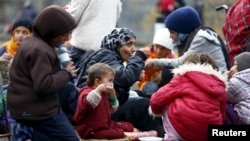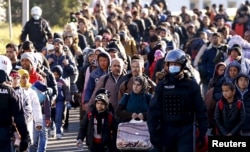The UN refugee agency reports more than one million refugees and migrants have reached Europe by sea alone this year, with 80 percent of this record number landing on small, overcrowded Greek islands.
The U.N. refugee agency says refugees fleeing war and persecution are paying a heavy price in their desperation to find a safe haven. It reports 3,735 people have lost their lives this year making the dangerous Mediterranean Sea crossing. This translates to an average of 10 deaths or missing persons every day.
The UNHCR reports the total number of seaborne refugees this year is nearly five times higher than last, when just over 200,000 arrived in Europe, making this the biggest refugee crisis in Europe since World War II.
Thousands still arriving
UNHCR spokesman Adrian Edwards says between 2,000 and 3,000 people — most of them Syrians — continue to arrive by boats on the islands of the Aegean every day despite the freezing cold temperatures and raging seas.
He tells VOA the refugees fleeing conflicts in their countries take to the sea because most land routes into Europe are blocked.
“There are restrictions at the border." he said. "We have countries that have erected fences along border, land borders and the sea really remains the main viable option for those people. Unfortunately, what it means though is that smuggling is profiting in a major way. It means that people are drowning. It means that the systems for making this regular movement of people are not yet in place.”
Edwards notes Europe’s migration crisis reflects, what he calls, an era of record-breaking forcible displacement. A recent UNHCR report finds the number of people who are refugees or internally displaced because of conflict now exceeds more than 60 million.
Earlier this month, a report by the International Organization for Migration said the number of refugees and migrants arriving in Europe by both sea and land this year was over one million.
Perception issue
The UNHCR spokesman says a major problem facing those fleeing to Europe is one of perception. He says this can be seen in the language people around the world use to describe this situation.
“Many people still prefer to talk about this as a migrant crisis rather than a refugee one," he said. "Now migrants migrate, refugees flee. Word choices really do matter. Both terms have become politically loaded in the context of the situation in Europe.”
Under international refugee law, Edwards says nations are obliged to offer protection to people fleeing conflict and persecution. He says efforts to blur the distinction between refugees and economic migrants are putting the lives of many people who have a legitimate claim to asylum at risk.






